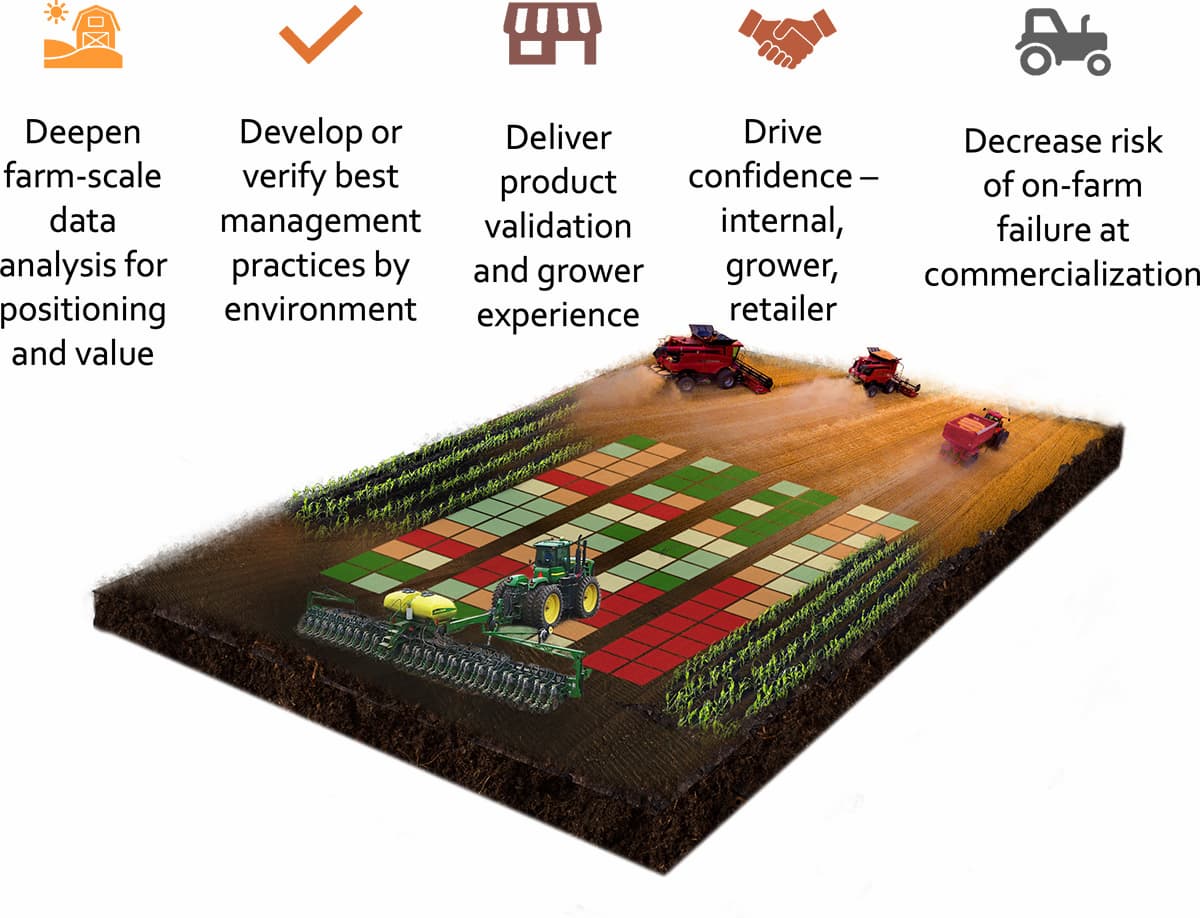In recent years, the agricultural landscape has witnessed a rapid surge in the development and deployment of cutting-edge crop input technologies. This revolution is particularly notable in the realm of biological products, such as biofertilizers and biopesticides. Traditional methods of field testing for product development are being reimagined to accommodate these innovative solutions. The agricultural product development landscape is evolving, and the role of large-scale on-farm replicated data, such as the revolutionary TrialWerx® system, is critical for success.
The Traditional Path to Product Development
Historically, the journey of bringing a new agricultural product to market involved several sequential stages. It would commence with “proof of concept” studies, carried out under controlled conditions. These studies aimed to provide initial validation of the product’s capabilities and a rough estimate of its effects. Subsequently, the product would undergo small-plot field testing across diverse environments and its performance accessed under varying conditions—considering factors such as soil type, weather patterns and pest varieties.
Once a candidate product meets the criteria for commercial viability, it would transition to farmer-level testing. This phase served three primary purposes:
- Product Introduction: It initiated product introduction through early adopters, which paves the way for future marketing efforts during the commercial stage.
- Feedback and Improvement: It gathered invaluable feedback on aspects of product utilization that might have been overlooked in earlier development stages. This included challenges related to handling, tank-mixing, seed treatment, and user reactions to the physical properties of the formulation.
- Efficacy Validation: Farmer-level testing served as the ultimate efficacy test. It validated the results obtained under semi-controlled conditions, at a scale susceptible to various sources of “noise.” These sources included variability in product application, interactions with other inputs like pesticides and fertilizers, a broader range of crop varieties, and significant within-field variations in soil conditions.
The data generated during this stage formed the bedrock for subsequent marketing endeavors, which made it crucial to account for these sources of variability in field-scale evaluations.
The Pitfalls of Naïve Approaches
Following a stage gate process such as the AgriThority® Prescriptive Response® service is essential, but regrettably, simplistic approaches to field-scale testing have often led to wishful thinking and can yield useless data for further commercial development. The “cherry-picking” strategy, characterized by split-field demo trials conducted in limited environments or unreplicated strips, lacks the precision necessary to provide true product insights to users. These approaches typically fail to consider the complexity of field variability, which results in the confounding of treatment effects with other factors influencing crop performance. These factors may include field elevation, water drainage, soil nutrient content, or the heterogeneous cropping history within the current field area.
A Paradigm Shift: TrialWerx®
Recognizing the need for high-quality, meaningful product performance data in the field-scale trials, AgriThority® has pioneered a revolutionary solution—the TrialWerx® approach. This system is specifically designed to address the unique challenges posed by new input technologies and demands a deep understanding of expected product performance variability.
The key components of the TrialWerx® system are:
- Selecting Adequate Environments at the Regional Scale: Careful consideration is given to the regional context to ensure the selected environments are representative of the broader agricultural landscape.
- Selecting Adequate Areas at the Farm Scale: Choosing appropriate farm areas is crucial to capture the diversity of real-world conditions.
- Intensive Mapping of Within-Field Variability: Detailed mapping of within-field variations is conducted to account for the nuances that influence product performance.
- Replicated Strips for Each Treatment: Replication is a cornerstone of TrialWerx® and provides robust statistical power to detect meaningful differences.
- Fine-Scale Tracking of Crop Growth: Spatial and temporal monitoring of crop growth offers insights into how the product performs across the entire field and throughout the growing season.
- Close Monitoring of Critical Farmer Operations: Understanding the impact of critical farmer operations on product performance is essential for accurate assessment.
- Objective Assessment Through Digital Technologies: Leveraging digital technologies enables objective and precise evaluations of crop growth and health.
- Analytical and Statistical Methods: TrialWerx® employs advanced analytical and statistical methods to handle the vast volumes of spatial and time-series data generated during testing.
The result of this meticulous testing process is robust, data-driven information that enhances product credibility. It empowers companies to optimize their product positioning and identifies environments and farming practices where the product’s value is maximized.

The future of advanced development field testing in agriculture hinges on embracing large-scale on-farm replicated data. The TrialWerx® system, with its comprehensive approach, represents a pivotal shift in how we evaluate new input technologies. By recognizing and mitigating sources of variability, we can ensure that the products of tomorrow are not only innovative but also effective, which will meet the evolving needs of the agricultural industry.
To tap into the AgriThority® expertise and discuss your product, reach out about TrialWerx®. This unique process provides in-depth analysis of comprehensive quantitative and qualitative data to improve performance evaluations while it defines value and positions the product for adoption and use.


